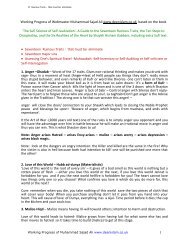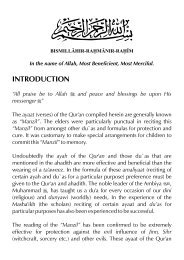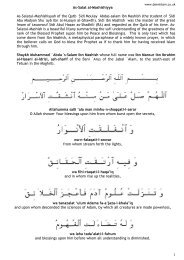Sufi Introduction to the 99 Names of Allah and sufi ... - Deen islam
Sufi Introduction to the 99 Names of Allah and sufi ... - Deen islam
Sufi Introduction to the 99 Names of Allah and sufi ... - Deen islam
You also want an ePaper? Increase the reach of your titles
YUMPU automatically turns print PDFs into web optimized ePapers that Google loves.
Collected by Muhammad Sajad Ali - webmaster – www.deen<strong>islam</strong>.co.uk - 10 th December 2009<br />
The reality <strong>of</strong> a thing indeed derives from its essential properties, but <strong>the</strong>y are multiple. Ano<strong>the</strong>r thing may<br />
share in some <strong>of</strong> <strong>the</strong>m without <strong>the</strong> first thing being "like un<strong>to</strong>" <strong>the</strong> o<strong>the</strong>r thing in all respects. For instance,<br />
<strong>the</strong> definition "animal" is applied <strong>to</strong> human beings <strong>and</strong> brute beasts, but a person is not "<strong>the</strong> like <strong>of</strong>," a horse,<br />
because one <strong>of</strong> <strong>the</strong> conditions <strong>of</strong> likeness is <strong>the</strong> sharing <strong>of</strong> all essential properties, <strong>and</strong> that cannot occur<br />
except in two individuals <strong>of</strong> <strong>the</strong> same sort.<br />
The kind <strong>of</strong> likeness here described is called literal or "intelligible" ('aqliyyah). Let us define it as perfect <strong>and</strong><br />
<strong>to</strong>tal equivalence. There is also partial equivalence, which arises when <strong>the</strong>re is sharing <strong>of</strong> some essential<br />
properties. Here likeness exists <strong>to</strong> <strong>the</strong> extent <strong>of</strong> sharing; after that point disjunction occurs.<br />
The realities refuse <strong>to</strong> accept an equivalence based on secondary, incidental attributes: <strong>the</strong>y do not belong<br />
<strong>to</strong> <strong>the</strong> reality <strong>of</strong> <strong>the</strong> essence <strong>to</strong> which <strong>the</strong>y are attributed, but are like accidents, even if <strong>the</strong>y are fixed <strong>and</strong><br />
<strong>the</strong>ir nonexistence is inconceivable. In such a case <strong>the</strong> equivalence could only be drawn between two<br />
attributes, not between <strong>the</strong> two entities in which <strong>the</strong> two comparable attributes subsist. For instance, one<br />
could propose that two "knowers" are equivalent, conceptually or actually, but if <strong>the</strong>y are [genuinely]<br />
equivalent it will be for some o<strong>the</strong>r reason [than "knowing"].<br />
Secondary attributes take identity from <strong>the</strong> individuality <strong>of</strong> that in which <strong>the</strong>y subsist. Their identity is<br />
dependent, just as [in philosophy] <strong>the</strong> place proper <strong>to</strong> a contingent event depends upon <strong>the</strong> space occupied<br />
by its substrate <strong>and</strong> is <strong>to</strong> <strong>the</strong> extent <strong>of</strong> its substrate, because <strong>the</strong> contingent event is sited [in <strong>the</strong> substrate].<br />
All this indicates that <strong>the</strong>re is no sharing <strong>of</strong> essential attributes between us <strong>and</strong> <strong>the</strong> Crea<strong>to</strong>r, whe<strong>the</strong>r <strong>to</strong>tal or<br />
partial. On account <strong>of</strong> this, from <strong>the</strong> perspective <strong>of</strong> <strong>the</strong> realities, "likeness" between us <strong>and</strong> Him is denied. Do<br />
not deceive yourself that He describes you as He describes Himself – as knowing, willing, <strong>and</strong> so forth. The<br />
brute beasts are described as hearing, seeing, <strong>and</strong> willing as well. So underst<strong>and</strong> that.<br />
Beauty. The selfsame verse, His saying:<br />
laysa ka-mithlilihi shay'un<br />
Nothing is like un<strong>to</strong> Him.<br />
is [according <strong>to</strong> Beauty,] a figurative, "verbal" (lughawiyyah) likening, as when people say "Zayd is like a<br />
lion." Here <strong>the</strong> ka has <strong>the</strong> sense <strong>of</strong> a preposition [meaning "as," instead <strong>of</strong> being read as part <strong>of</strong> <strong>the</strong><br />
compound word ka-mithlilihi. The verse <strong>the</strong>n reads:<br />
Nothing is like His likeness.<br />
With this <strong>the</strong> Truth descends in <strong>the</strong> station <strong>of</strong> openness <strong>and</strong> <strong>the</strong> attribute <strong>of</strong> Beauty upon <strong>the</strong> hearts <strong>of</strong> <strong>the</strong><br />
Knowers. In this reading <strong>Allah</strong> denies that He has made <strong>the</strong>m resemble anything else in His whole creation –<br />
just as, in His Majesty, He denies that <strong>the</strong> creation resembles Him.<br />
In this reading He gives word <strong>of</strong> <strong>the</strong> superiority <strong>of</strong> <strong>the</strong> human being over all creatures <strong>and</strong> all else in<br />
existence. So <strong>the</strong> reality <strong>of</strong> <strong>the</strong> human being is not bound <strong>to</strong> one estate. <strong>Allah</strong> has assured him <strong>of</strong> <strong>the</strong><br />
attributes <strong>of</strong> completeness <strong>and</strong> perfection, made him overflow with His grace, <strong>and</strong> given in<strong>to</strong> his possession<br />
<strong>the</strong> keys <strong>of</strong> <strong>the</strong> Divine <strong>Names</strong>. From this figurative likening [<strong>of</strong> <strong>the</strong> human <strong>and</strong> <strong>the</strong> divine] humanity derives<br />
its stewardship <strong>of</strong> <strong>the</strong> Creation. By it <strong>the</strong> two worlds are supported. By it <strong>the</strong> spirits are subdued; <strong>of</strong> it <strong>Allah</strong><br />
spoke (Jâthiyah 13):<br />
152







